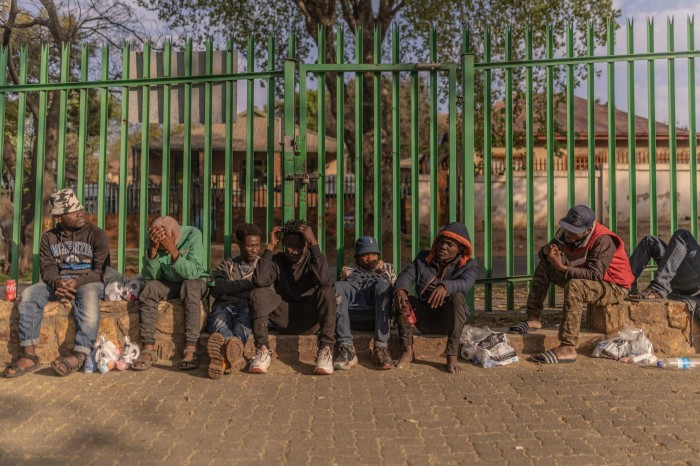Eighty-three men who escaped being burnt alive in a Johannesburg slum waited patiently or dozed on the grass of a suburban community centre turned rescue shelter.
All were foreigners to South Africa — 68 from Tanzania and 15 Malawians — like many of the other 77 who died in the inferno at 80 Albert Street in the city’s rundown Marshalltown area in the early hours of August 31.
Hundreds of people lived at the decrepit municipally owned building, where gangster landlords charged R2,000 ($105) a month for a room that slept four or more. This is all most people could afford after eking out a living working as street vendors or in odd jobs and sending remittances to alleviate poverty in their home countries.
Adamu, 28, one of the survivors, ran a small tuck shop near the property’s entrance. He said he came to South Africa “to hustle, to try to make my life better . . . I was supporting my family with that business”.
He declined to use his real name out of fear he could be deported. Like the others who lived through the disaster, he must start again after losing everything, and faces going back to another overcrowded slum. “You don’t have a choice,” Adamu said.
The building where he almost lost his life once symbolised South Africa’s transition from apartheid to democracy. Now it reflects systemic failures not only in South Africa but in economies across the region.
For decades, 80 Albert Street was an office of the white minority regime that issued the hated “dompas” passports that restricted where black South Africans could go. After democracy began under Nelson Mandela, it was converted into a women’s shelter and clinic.
Yet over the past decade, like many buildings at the core of Africa’s wealthiest city, both publicly and privately owned, it has fallen into squalor.

In a reflection of contempt for immigrants, residents said police extorted money whether passports were in order or not and South African landlords threatened them with guns. “If you didn’t pay, they chased you out on to the street, saying you’re not South African,” Adamu said.
More recently, financial crises and political squabbling meant clear warnings of danger were ignored.
The cause of the blaze is not known but a warren of shacks and locked gates were an inferno waiting to happen, according to survivors. Many were forced to jump from upstairs windows as the flames raged below.
President Cyril Ramaphosa said this week that the tragedy had “brought to the fore the need to resolve the challenge of housing in our cities”.
But the Marshalltown building was neglected as Ramaphosa’s ruling African National Congress warred with opposition parties for control of the city.
In a 2019 report seen by the Financial Times, the city council was warned of the “rapid deterioration of this illegally occupied building”, including destroyed emergency fire systems, burnt electrical wiring and illegal electricity connections. It called on the city-owned property company and police to urgently take back and seal off the premises.
Nothing was done by the “delinquent” property company, said Mpho Phalatse, who as a city councillor had moved to shut down the building’s clinic due to the squalor. The company did not respond to a request for comment.
Political turmoil after 2019, a carousel of unstable opposition and ANC administrations, meant more chances were lost. It was difficult not only to clean up institutions such as the property company but to secure immigration capacity to process the undocumented after evictions and finance emergency housing to shelter them, under requirements set by South Africa’s highest court.
Phalatse rose to become mayor but was ejected this year as the ANC enticed smaller opposition parties away.
Since the fire, this alliance has given little sign that institutional reform was a priority. One of its members said on the day of the blaze that “it clearly tells us that we don’t have world-class African citizens that heed the law”.

“The current administration is not really focused on rebuilding the city. Their focus has been elsewhere,” Phalatse said. “When you do that, there will be consequences. Seventy-seven people died because you ignored major recommendations.”
The Marshalltown fire’s deaths are an indictment not just of a city and a society but of a region. Poverty traps across southern Africa, including in Malawi and Tanzania, but also Zimbabwe, Lesotho and elsewhere, have pushed migration towards South Africa, which has a relatively advanced economy but stagnant growth and deteriorating infrastructure.
In the four or more years since many of the fire’s Tanzanian and Malawian victims and survivors arrived in South Africa, their countries have undergone political changes. But they still offer little economic incentive to return.
In 2020, Malawi’s president Lazarus Chakwera became the first African opposition leader to win a rerun of a fraudulent election. He promised to stop systematic graft leeching donor-dependent finances. But the nation with the highest population density in mainland southern Africa was nevertheless confronting a “protracted macro-fiscal crisis”, the World Bank has said.
In Tanzania, the strongman politics of former president John Magufuli died with him in 2021, but the economy is struggling to absorb one of the world’s fastest rates of demographic expansion. A population that was just under 62mn last year could rise to 140mn by 2050, the World Bank has said.
The year of Adamu’s birth, 1995, was a more hopeful time for southern Africa. That year, his country held its first multi-party elections since independence. A year earlier, Mandela had won South Africa’s first democratic vote.
Despite the trauma of the fire and hostility from some South Africans, most survivors at the rescue shelter felt they had no choice but to stay.
“We know in Tanzania that South Africans hate foreigners, but we still have hope,” said one. “We know they hate us but we . . . still want to come.”
